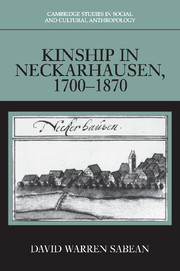Book contents
- Frontmatter
- Contents
- List of tables
- Abbreviations
- Abbreviations of sources
- On reading kinship diagrams
- Glossary
- Preface
- Introduction
- Cohort I (1700–1709)
- Cohort II (1740–1749)
- Cohort III (1780–1789)
- 11 Consanguinity as a principle of alliance
- 12 The formation of an alliance system
- 13 Ritual kinship and alternative alliance
- 14 Naming and patrilineal alliance
- Cohort IV (1820–1829)
- Cohort V (1860–1869)
- Conclusion
- Appendix
- Bibliography
- General index
- Index of villagers
13 - Ritual kinship and alternative alliance
Published online by Cambridge University Press: 04 August 2010
- Frontmatter
- Contents
- List of tables
- Abbreviations
- Abbreviations of sources
- On reading kinship diagrams
- Glossary
- Preface
- Introduction
- Cohort I (1700–1709)
- Cohort II (1740–1749)
- Cohort III (1780–1789)
- 11 Consanguinity as a principle of alliance
- 12 The formation of an alliance system
- 13 Ritual kinship and alternative alliance
- 14 Naming and patrilineal alliance
- Cohort IV (1820–1829)
- Cohort V (1860–1869)
- Conclusion
- Appendix
- Bibliography
- General index
- Index of villagers
Summary
All along I have been arguing that both marriage and ritual kinship offer forms of exchange that establish durable relationships between individuals, houses, and families. Each form of alliance in Neckarhausen set up channels along which exchanges of various kinds could flow. There were, of course, other relationships (such as guardianship) that also set up long-term connections between people, but the field from which guardians, Kriegsvögte, and the like were chosen was usually already marked out by marriage alliance or by the prior selection of godparents. Not long after any couple married, they chose two Gevatter(inne)n who in principle stood by them in the church every two years or so for up to two decades and who would be associated as Doten/Döten with the children of the house as long as they lived. Whatever the particular nature of this persisting relationship, the continuing connection itself is evidence of a continually reinforced bond between several households and their kin and friends.
What godparentage was in itself is not easy to specify. It always had a protean aspect. Even people who were not especially pious chose (or had to choose) godparents for their children, which underlines the fact that its spiritual meaning was never stable, or at least not always straightforward. Some anthropologists have tried to find a universal desideratum in the institution, whereby godparents are thought to represent society at large while parents pull in the direction of the family.
- Type
- Chapter
- Information
- Kinship in Neckarhausen, 1700–1870 , pp. 238 - 255Publisher: Cambridge University PressPrint publication year: 1997



